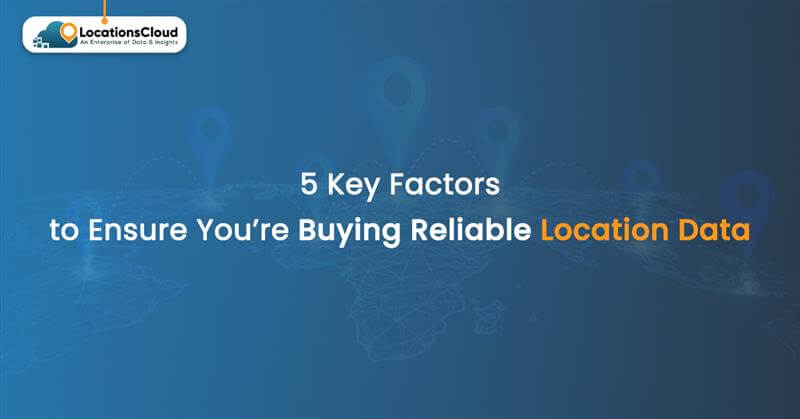
Location data is required for businesses such as retail, real estate, urban planning, logistics, hotels, restaurants, and food delivery services. The location data helps in making informed investment and expansion decisions, as well as conducting competitive analysis. Location intelligence helps retail stores determine the optimal location for their new stores, restaurants can analyze competitive saturation using location data from other restaurants, and hotels can utilize the data to identify underserved areas.
The data also supports urban planning in identifying new areas for development projects, infrastructure design, and other related initiatives. The data also helps track foot traffic and Point of Interest (POI) locations, among other things. Location data from Google Maps is used for business location analysis.
However, all the above use cases are valid only when your location data is accurate, well-tabulated, and extracted using reliable means. This means that you need to ensure you’re buying reliable location data from a trustworthy Location data provider.
Here are five essential factors to consider when purchasing location data to ensure reliability.
1. Data Collection Method
Google Maps, as well as business listing platforms that include addresses, retail foot traffic, and GPS, are sources of location data. Various methods, including web scrapers, APIs, and other data extraction tools, are employed to extract this location data from online platforms. The data collection method is a crucial criterion in determining whether the data is reliable or not. If you deploy the wrong method or a poor-quality web scraping tool, the collected data will be inaccurate and will not aid in analysis.
You can gauge expertise in data collection by asking questions about their technical capabilities, such as how they handle IP blocks, CAPTCHAs, and rate limits on websites. Also, check how they extract location datasets from websites with dynamic layouts. Knowing their technical abilities will provide an idea of whether they are reliable to trust with location data intelligence.
2. Industry Expertise of Location Data Provider
The location datasets provider must possess expertise, experience, and technical competencies in the field of data extraction. Also, they must know how location datasets are created, tabulated, and delivered. Select a reputable location data provider with real-world experience in extracting location data for various industries. Location data has varied applications. Different types of location data (POI data, mobility data, boundary data, etc.) have different types of use cases. From retail site selection to real estate project decisions, location data serves as a differentiator for reliable insights into various businesses. Select a provider that specializes in the type of location data you require.
3. Inclusive Data & Analytics Support
Before purchasing location data, verify that the data is complete and comprehensive. For example, if you are purchasing data on the retail store locations of a brand across the USA, you should verify that the data also includes stores in rural and remote areas. Also, verify that upcoming stores and closed stores are accounted for and listed in separate tables.
Another factor is the analytics support. You are buying location data for location analysis and location intelligence. Therefore, the location data must be analysis-friendly. The data must be well-tabulated and ready for analysis. It should be in a format that can be easily integrated with the data analytics tools.
4. Data Accuracy
Don’t buy location data unless the location data service provider ensures 99.99% data accuracy. Yes, data precision is important, and it is a commitment that cannot be compromised. Evaluate the provider’s commitment to data accuracy and reliability. Data accuracy also means that the data is fresh and validated using standard processes. Check the error margins used by the location data provider and the validation methodologies employed.
Precision is non‑negotiable, as even small errors can lead to big analytical mistakes. Ask how frequently the data is refreshed and whether they use automated checks (e.g., cross‑referencing with authoritative sources) and manual audits to catch anomalies.
5. Data Privacy Compliance
Ensure your location data provider adheres to relevant privacy standards and obtains data through legitimate means. Data privacy laws worldwide are stringent. User permissions and consent are crucial factors that impact both compliance, ethical extraction, and data quality. Ensure the location datasets provider adheres to all relevant data privacy regulations (e.g., GDPR, CCPA) and industry best practices for the ethical extraction and compilation of data.
You can ask how they collect, store, and share information.
Confirm that any personally identifiable information (PII) is not collected. Also, review their data access controls, encryption standards, and other relevant security measures.
Need Accurate Location Data? Get It Right!
Ready to leverage accurate geodata? Get expert insights and make smarter purchases!
Conclusion
From data capabilities and privacy compliance to a strong track record, there are various factors that ensure the reliability of location data. At LocationsCloud, we have helped industries, business verticals, and renowned brands obtain the most reliable location datasets they need for their specific use cases.
We work with companies (small, mid-sized, and large) to understand their location dataset needs and provide them with custom location data tailored to their specific requirements. If you are looking for a reliable partner for accessing the most accurate location datasets for analysis and decision-making assistance, we are the professionals you can rely on. Connect with LocationsCloud to know more or buy location datasets here



